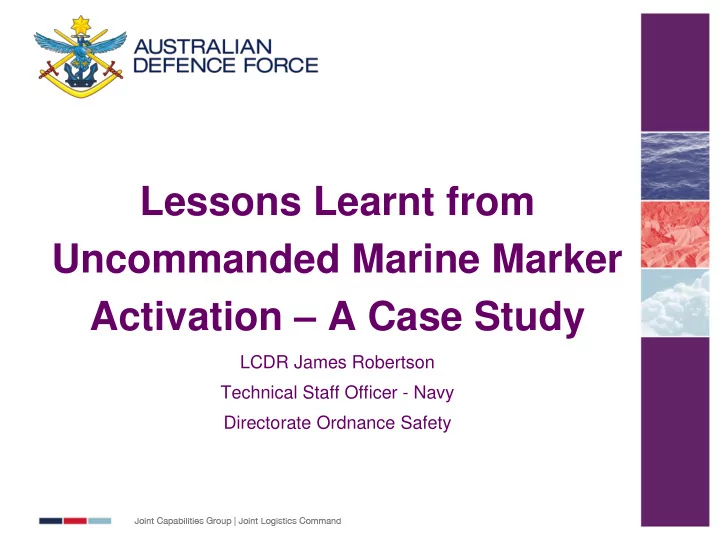

Lessons Learnt from Uncommanded Marine Marker Activation – A Case Study LCDR James Robertson Technical Staff Officer - Navy Directorate Ordnance Safety
Scope • Incident • Summary of Mk58 design • Cause of incident • Contributing factors • Remediation activities • Lessons learnt
Incident 12 Jan 19 – A Mk58 Marker Location Marine (MLM) experienced an uncommanded initiation on Australian Warship HMAS Warramunga while berthed at Fleet Base East, Sydney 550 mm
Summary of Mk58 Design - Employment • Marking location at sea (by ships and aircraft) • Emergency Low Visibility Approach by aircraft to ships
Summary of Mk58 Design - Activation • Ring pull removed – exposes sea-water activated battery • Launched in to sea – battery activates
Summary of Mk58 Design – Operation • Battery activates squib which ignites starter composition • The first red phosphorous candle ignites • As first candle burns out, second candle ignited by time fuze
Cause of Incident • Ingress of saltwater in to battery cavity • Contributing factors – Inappropriate venting procedure – Exposure to saltwater due to external cooling of pyrotechnics lockers
Contributing Factors – Lifing Changes Shelf Life: Three (3) Years Australian Life Service Life: One (1) Year = 15 years
Contributing Factors - Venting • Australia added requirement for venting • No evidence found of when or why requirement added • Likely due to concerns regarding gas evolution over long life • OEM does not recommend venting
Contributing Factors – S3 Assessment [1] O 2 and CO 2 Gas Levels in Mk58 Composition Over 6 Months 25 Percentage of Gas 20 15 10 5 0 0 50 100 150 200 Days CO2 O2 [1] M Ringwald, ‘Red Phosphorus Gas Generation Study’, NSWC, 04 August 1991
Contributing Factors - Maintenance Extract from Australian “Explosive Ordnance/Weapons Preparation Manual”
Summary of Contributing Factors Long, non-OEM Life Non essential venting of due to Mk58 due to Poor S3 Processes Poor S3 Processes Mk58 Battery Cavity Seawater Cooling of Punctured due to stowage locker due to Poorly Implemented High Temperatures Venting procedures Seawater ingress to Mk58 battery due to Uncommanded Initiation of Mk58 Poor Watertight Integrity of Locker
Safety Case Management • Explosive Ordnance Design Assessment (EODA) - 2011 • Conducted to rectify previous “Grandfathering” of Mk58 • Accepted many of the previously unsubstantiated decisions on issues such as lifing and venting • Supplementary EODA – 2013 • Prompted by integration of item on to new platforms • Still did not address many of the issues in original EODA
Safety Case Management – Failure Mode • Review of incidents conducted (2011 – Present) • 29 Incidents where items failed to function on correct deployment – Well within required 90% Operational Level of Reliability • 25 Reported Unexploded Ordnance Incidents involving Mk 58 – Self-scuttling of item relies on item filling with water after candles are expended – When item fails to function, tends to float due to not filling with water – Item does not fail-safe – Tend to wash up on beach, majority on civilian beaches
Remediation Activities • All stakeholders – The practice of venting Mk58 has been ceased – All user units have returned vented items – All vented items at depots segregated and will be disposed of • Acquisition and Sustainment Agency – Audit of all documentation remove requirement for venting – Reduce service life to 7 years based on 848 similar items in storage with no evidence of bulging – In Service Surveillance Program to gather quantitative evidence to support this lifing – Rebuilding of the Safety Case using evidence – 12 month operational life in maritime environments
Lessons Learned • A lack of past incidents doesn’t equate to an absence of safety concerns • Must be vigilant and systematic in reviewing past safety cases to identify potential risks • When updating/maintaining Safety Cases don’t assume previous assessments meet contemporary standards • S3 and Engineering assessments should be based on primary source evidence whenever possible • Maintenance requirements should be identified through rigorous engineering analysis • Lifing needs to be evidence based • In Service Surveillance is a key tool in maintaining the validity of safety cases
References 1. Explosive Ordnance Design Assessment 1 Marker Location Marine Mk 58 Mod of 22 Jul 11 2. Supplementary Explosive Ordnance Design Assessment Marker Location Marine Mk 58 Mod 1 of 12 Aug 13 3. QPL-CWEO-5021-113 Certification Delta Assessment Marker Location Marine Mk 58 Mod 1 v1.0 of 14 Mar 13 4. Meeting Minutes KC-58 EOSM and System Safety Working Group of 23 May 19 5. Kilgore Flares KC-58 Marine Location Marker Brochure 6. Red Phosphorus Gas Generation Study, Mike Ringwald of 08 Apr 91 7. Email Werner Sperber / (FLTLT O’Brien, Troy Smith) of 14 Mar 19 8. DEOP Topic -32 Marker Location Marine Mk 58 Mod EO/Weapons Prep Manual 1 Issue 1 9. Explosive Ordnance Safety Message 1900014 – Marker Location Marine Mk 58 Mod 1 of 24 May 19 10.DEOP Topic -26 Marker Location Marine Mk 58 Mod 1 Design Limit Summary Issue 1 11.Technical Investigation Uncommanded Initiation of MK58 Mod 1 Marker Location Marine of 09 Sep 19
Questions
Extra Notes
Recommend
More recommend